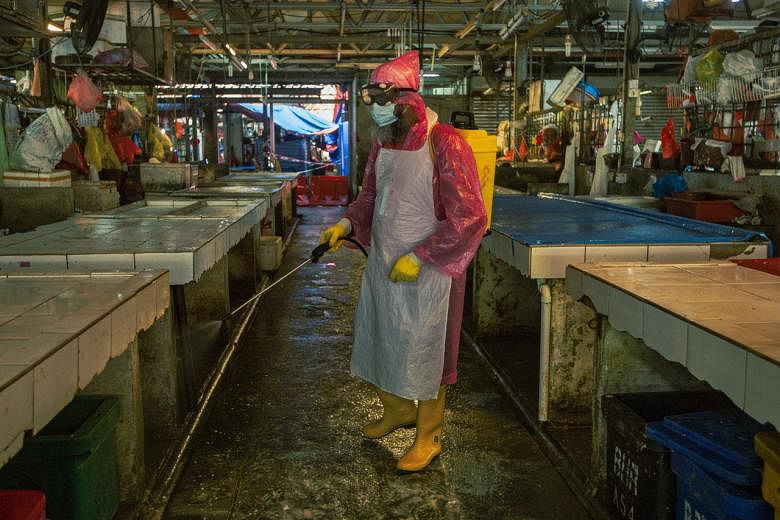PETALING JAYA (THE STAR/ASIA NEWS NETWORK) - The supply of vegetables in the Klang Valley and in several neighbouring states has been hit by the temporary closure of several wholesale and big markets in KL and Selangor for health checks and cleansing due to the coronavirus pandemic.
Malaysia's largest wholesalers' market, Pasar Borong Kuala Lumpur, was shut last week after some workers were found carrying the Covid-19 disease.
The market supplies fresh vegetables to wet market traders, sundry shops, convenience stores and some hypermarkets in the Klang Valley, Negeri Sembilan and the Pahang state capital Kuantan. The vegetables are mostly grown locally including those from Cameron Highlands.
The Klang Valley, with total population of some 7 million, includes Malaysia's commercial capital Kuala Lumpur, the country's administrative capital Putrajaya and Selangor cities Shah Alam and Petaling Jaya.
Kuala Lumpur Vegetable Wholesalers Association president Wong Keng Fatt said some wholesalers and their workers are still waiting for their Covid-19 test results while observing self-quarantine for 14 days.
Mr Wong was quoted as saying by The Malaysian Insight online news on Wednesday (April 29) that vegetable prices at the wholesale market could increase by 30 per cent to 70 per cent due to the disruption.
"In order to enter the market, both wholesalers and their customers (market traders) will need to produce proof that they tested negative for the virus," Mr Wong said.
"We cannot operate until we are given the all-clear by the authorities. This has affected supplies to wet market traders," he added.
Vegetable traders from wet markets make up 60 per cent of the customers of the wholesalers.
Pasar Borong KL, located in Selayang district, was reopened last week after it was closed for several days for sanitisation and decontamination procedures, resulting in fewer wholesalers operating there.
Malaysia on Thursday (April 30) was into the 44th day of the movement control order (MCO).
Senior Minister Ismail Sabri Yaakob announced on April 20 that total lockdown of areas around the wholesale market, called enhanced MCO, would be enforced until May 3.
The situation was compounded when other wet markets, including in Petaling Jaya's Taman Megah and Jalan Othman, and the ever-busy Chow Kit market in the capital were also shut down for the same anti-coronavirus checks and cleansing.
On Monday (April 27), the wet markets in Taman Megah and in Bahau, Negeri Sembilan, were closed after vegetable traders were found to be infected after they went to the KL wholesale market.
Federation of Malaysian Vegetable Farmers Association president Tan So Tiok said the farmers have to look for other market traders to buy their produce.
"Some farmers have utilised trading platforms on the Internet. But vegetables are perishable. Some of the unsolds will have no choice but to be disposed of, minus those that can be given away, " he said.
Mr Tan said the authorities, when shutting down any market for enhanced MCO, should give time for wholesalers or traders to sort out their stockpile.
"We have seen cases of vegetables left to rot at the market. It was a heartbreaking sight, " he said.
For now, Mr Wong, who had his second Covid-19 test done on Wednesday, said there are 80 vegetable wholesalers who can still operate as usual at Pasar Borong KL while the rest have been ordered to close temporarily.
All 216 wholesalers are expected to be fully operational from May 2 when the quarantine period is over and their second test results come out, he said.
From earlier April, all wholesalers and their workers at the market were instructed to go for Covid-19 screening and observe self-quarantine as a precaution even if they were negative.











